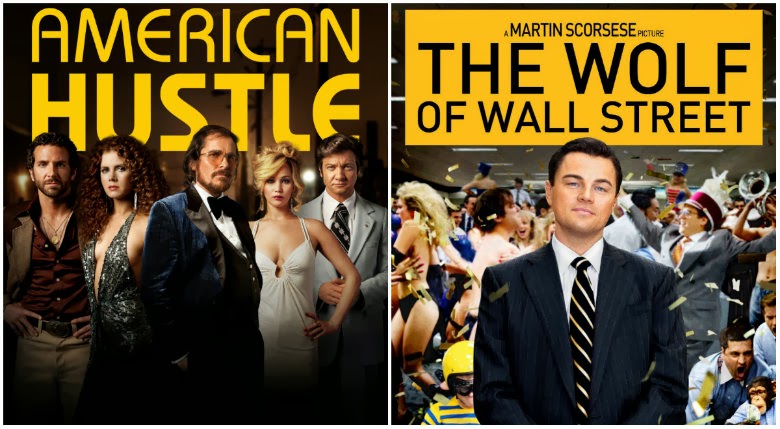Written by Leigh Kolb.
Two of this year’s Oscars contenders–The Wolf of Wall Street and American Hustle–are based on true stories. These stories center around greed and corruption. The characters cheat and lie their way into and out of the American Dream.
The men get the most attention for their greed and corruption. However, if we look a bit closer, the films’ women are the ones who can be traced to plant bigger, fatter seeds of avarice. This wouldn’t bother me, as I’m always in favor of more complex female characters (even if they’re unsympathetic), but what strikes me is that we barely notice these scenes. The women become victims and damsels, when oftentimes the ideas were their own.
Is this some kind of 21st century version of the femme fatale? A woman who is coercive–not only sexually, but also financially–but who isn’t taken seriously as a power player? Is it just embedded in us to not notice women’s power or ignore their parts in the narrative?
In both The Wolf of Wall Street and American Hustle, women plant the ideas that become the stories themselves. We shouldn’t point at them and scream, “Jezebel!” or blame them entirely for the greed and corruption. Instead, I think it’s important that we recognize them as part of the story, and not as characters who need saving.
The Wolf of Wall Street‘s quiet, victimized femme fatales are harder to identify. In fact, when we watch The Wolf of Wall Street, the power and corruption of bloated, desperate masculinity screams at us from every frame–women are objectified, and men hold the power.
However, some key moments in Jordan’s (Leonardo DiCaprio) professional life are influenced by women. When he loses his first job on Wall Street after Black Monday, his wife Teresa (Cristin Milioti) shows him an ad for a job at the Investors Center, where he goes to sell penny stocks quite successfully. When he starts taking people’s money in earnest, Teresa says, “Wouldn’t you feel better selling to rich people who could afford to lose money?” The rest is history.

Then come the strippers and the marching band, and the scathing “Wolf of Wall Street” article in Forbes. There’s “no such thing as bad publicity,” Teresa says.
Pretty soon, Jordan is hooked on quaaludes. He points out that the history of quaaludes–how they were first prescribed to housewives, and then became recreational drugs (this Paris Review article notes that they were prescribed to “nervous housewives” and went on to be discovered by “curious teenagers” who raided their mothers’ medicine cabinets). Here we have a shift: all of a sudden, what was once a woman’s game was now co-opted, blown out of proportion, and reckless.
Soon, Jordan is with Naomi (Margot Robbie). He goes into her apartment and is beeped by Teresa (“Go home to your wife,” he says to himself). Naomi steps out naked, and they have sex instead.
She didn’t come, though. It’s pointed out that she doesn’t come, which is important–she’s seductive, but not satisfied. She’s sexy, but not sexual. (Or maybe Scorsese was trying to avoid an NC-17 rating, since doing blow out of a prostitute’s ass crack is R material, but female orgasms are just too scandalous.)

Teresa and Naomi both are suddenly victims, discarded and consumed by Jordan’s lifestyle. We feel sorry for them, and they seem to be powerless (except for Naomi’s use of withholding sex). Their motivations and their power are erased by misogyny (figuratively in the story, or literally through violence and rape). I suppose this is actually in keeping with history–a history that favors men, and typically erases women’s involvement.
However, in American Hustle, Sydney (Amy Adams) shares center stage. She is a formidable scammer. She fabricates a persona, adopts an accent, and partners with Irving (Christian Bale) as a scam artist. Her power is fairly clear, and her nomination for the Best Actress Academy Award reflects her spotlighted role.
When Sydney and Irving meet, they are both already con artists in their own right. Sydney points out to Irving “how easy it could be to take money from desperate people.” With her involvement, his business takes off. Irving was a small player before Sydney; she takes their business to the next level.

Before long, though, Sydney is a damsel in distress–needing to be rescued by either Richie (Bradley Cooper) or Irving, and pitted against Irving’s wife, Rosalyn (Jennifer Lawrence). Her jealousy and cattiness take over, and she and Rosalyn seem at times to be liabilities because of their unbridled passion. All of a sudden, Sydney’s role as a powerful female force is whittled away. I want to be able to look at a female character and fully realize her power and potential, and recognize her role as an agent of change–even if that change is corrupt. It’s unfortunate to watch her weaken because of romantic relationships, and for her adversary to be the wife who almost tears everything down with her jealousy.
There’s a relatively happy ending for Irving and Sydney–they have legal jobs, and share custody of Irving’s adopted son, while Rosalyn has also found a new partnership. I don’t deny that Sydney is a strong character in her own right; however, a viewer could easily see her role as softened, muted somehow because of her jealousy.

It’s simply too easy for viewers to file women away in the “victim” category, or to not take them seriously as power players. Don’t get me wrong–I don’t think the answer to this problem is to always force female characters into leading roles, especially if the story on screen revolves around a male character. But there must be a way to avoid victimizing women and dismissing their motivations and actions, overshadowing them by female tropes. The male supporting characters are able to be seen as complex–American Hustle‘s Richie, Carmine (Jeremy Renner), and Stoddard (Louis C.K.), and The Wolf of Wall Street‘s Donnie (Jonah Hill), Patrick (Kyle Chandler), and Max (Rob Reiner) are likable and despicable, sympathetic and sinister. It’s possible.
I also wouldn’t want viewers to blame the women fully for the men’s actions, seeing them as simply vamps or temptresses who lead men astray. There’s some kind of middle ground that needs to be explored–and that ground is seeing women as complex human beings.
The women in The Wolf of Wall Street and American Hustle have power in pivotal moments, but it seems too easy for the audience to disregard due to cultural expectations and ideas about women and story lines that have them fade–just enough–into stereotypes. When women have formidable power behind the scenes, it would be nice to see that fully realized on the screen. We need a culture shift to move away from the dangerous dichotomies that wedge women into Madonna or whore, damsel or temptress. It’s up to writers and audiences to make that a reality.
See also at Bitch Flicks: Women’s Bodies in the Oscar-Nominated Films, The Academy: Kind to White Men, Just Like History
Leigh Kolb is a composition, literature and journalism instructor at a community college in rural Missouri.








